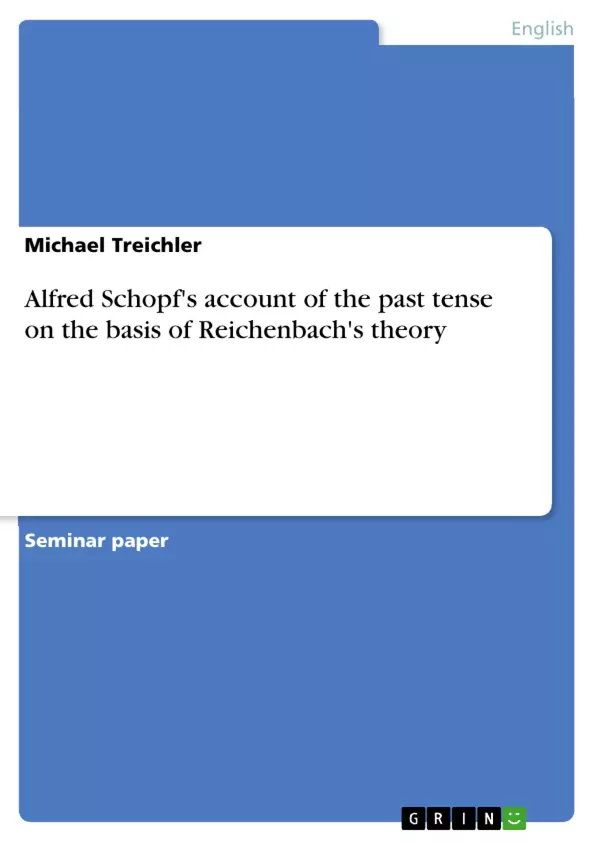With the presentation of his theoretical model for the semantic analysis of tenses, Hans Reichenbach (1947: 287 – 298) supplied to linguistic research a tool that has since then been made use of in a large number of publications. His model, consisting of the three core elements point of speech (S), point of event (E), and point of reference (R), has been widely accepted to constitute an appropriate theory for the analysis of the English verbal tenses. Nevertheless, since its first publication, several attempts and proposals for modifications on Reichenbach’s model have been presented.
In most of these works, the focus is pointed on research on the past tense. A large number of linguists as well as logicians have proposed modifications concerning different temporal extensions of both reference and event time, interpretations of these two times in terms of definite and indefinite points in time, their relation to each other, and, finally, successive reference points in sentence sequences. Therefore, when Alfred Schopf (1987) presents his proposal, it has a basis of a long tradition of earlier works containing different views and proposing different approaches which can either be followed or rejected.
In this paper, Schopf discusses three aspects of the use of the English past tense and refines Reichenbach’s analysis of this tense. First, Schopf explains the information conveyed by an isolated past tense sentence by interpreting it in terms of a search instruction. Secondly, he contributes to the discussion about the progression of the point of reference in a sequence of sentences. Finally, Schopf presents his proposal for an account of the use of the past tense in substitutionary speech.
The aim of the present paper will be to discuss Schopf’s approaches in comparison to Reichenbach’s model. It will be attempted to demonstrate which elements of Reichenbach’s account have been left unchanged by Schopf and which elements, on the other hand, have been modified by him. Since not all parts of Schopf’s analysis have their origin in Reichenbach’s theory, it will furthermore be discussed in which way he adds modules of other approaches to Reichenbach’s model and also introduces own proposals. Furthermore, each aspect of Schopf’s approach will be discussed for its ability to fulfil the aims Schopf sets in his paper.
Table of Contents
- Introduction
- The interpretation of an isolated past tense sentence
- The progression of the reference time in sentence sequences
- The Past Tense used for the expression of substitutionary speech
- Conclusion
Objectives and Key Themes
This paper aims to analyze Alfred Schopf's refinements of Reichenbach's model for the semantic analysis of the English past tense. The analysis will focus on how Schopf modifies and expands Reichenbach's theory, highlighting the changes made to the model and the introduction of new concepts. Additionally, the paper will assess the effectiveness of Schopf's proposed adjustments in fulfilling the objectives outlined in his work.
- The interpretation of isolated past tense sentences
- The progression of the reference time in sentence sequences
- The use of the past tense in substitutionary speech
- The integration of event notions into Reichenbach's model
- The role of extra-linguistic context in interpreting past tense sentences
Chapter Summaries
- Introduction: This chapter introduces Reichenbach's model for the semantic analysis of tenses and outlines the significance of Schopf's contribution to the discussion on the English past tense. It highlights the existing debate surrounding Reichenbach's theory and positions Schopf's work within this context.
- The interpretation of an isolated past tense sentence: This chapter delves into Schopf's approach to interpreting past tense sentences by examining the concept of event notions and their impact on the definition of reference time. It contrasts Schopf's model with Reichenbach's theory, showcasing the modifications made to account for different types of event times and reference times.
- The progression of the reference time in sentence sequences: This chapter explores Schopf's analysis of the progression of the reference time in sentence sequences, focusing on the changes made to Reichenbach's model in this context. It examines how Schopf's approach addresses the complexities of reference time shifts within sequences of sentences.
- The Past Tense used for the expression of substitutionary speech: This chapter examines Schopf's analysis of the past tense used in substitutionary speech, discussing the specific modifications made to Reichenbach's model in this area. It analyzes how Schopf's approach accounts for the unique features of past tense usage in situations involving substitutionary speech.
Keywords
This paper focuses on the semantic analysis of the English past tense, specifically analyzing the work of Alfred Schopf in relation to Hans Reichenbach's theory. Key concepts include event notions, reference time, event time, substitutionary speech, and the integration of pragmatic context in interpreting past tense sentences.
Frequently Asked Questions
What is Reichenbach's theory of tenses?
A model for semantic analysis using three core elements: point of speech (S), point of event (E), and point of reference (R).
How did Alfred Schopf modify Reichenbach's model?
Schopf refined the analysis of the past tense by interpreting isolated sentences as "search instructions" and analyzing the progression of reference points in sequences.
What is "substitutionary speech" in Schopf's work?
It refers to the specific use of the past tense in literary or reported contexts where the tense reflects a character's perspective rather than the narrator's time.
What is the "point of reference" (R)?
It is the temporal standpoint from which an event is viewed, crucial for distinguishing between simple past and perfect tenses.
Does extra-linguistic context matter for tense interpretation?
Yes, Schopf emphasizes that pragmatic and situational context is often necessary to correctly identify the reference time in past tense sentences.
- Quote paper
- Michael Treichler (Author), 2004, Alfred Schopf's account of the past tense on the basis of Reichenbach's theory, Munich, GRIN Verlag, https://www.grin.com/document/24772



